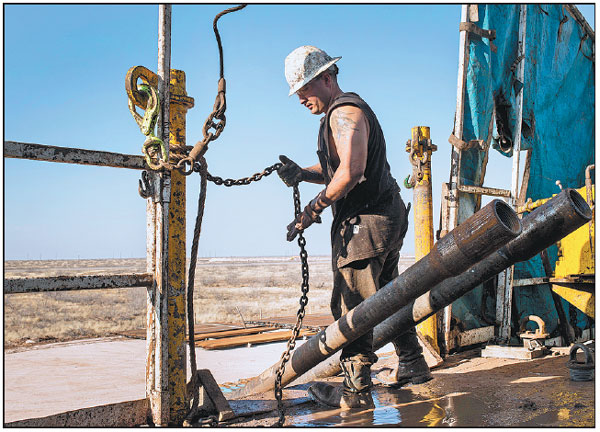Rebound in oil price to $100 seen unlikely by Saudis amid shale surge
|
A worker at Endeavor Energy Resources LP's Big Dog drilling rig near Midland, Texas. US oil output reached 9.42 million barrels a day this month, the highest rate in weekly Energy Information Administration data going back to 1983. Brittany Sowacke / Bloomberg |
Oil won't rebound to $100 a barrel because increased prices would draw more shale and other output from higher-cost producers to the market, said Mohammed al-Madi, Saudi Arabia's governor to OPEC.
"It will be difficult to reach $100 or $120 another time," al-Madi said at a conference in Riyadh on Sunday. "This will let the high-cost producers come back again." Saudi Arabia, the nation leading OPEC in defending its share of the global crude market, is pumping about 10 million barrels a day of crude, the country's Oil Minister Ali al-Naimi said. That's close to the record amount it produced in 2013.
Brent oil, the global benchmark, declined almost 50 percent in the past year as Saudi Arabia and others in the Organization of Petroleum Exporting Countries committed to maintain output amid a global surplus. The kingdom is able to meet demand from any customer, al-Naimi said at the conference.
"Shale oil companies are one of the high-cost producers that benefited from high oil prices," al-Madi said. "We're not against shale oil. We welcomed shale oil but it's not fair for high-cost producers to push low-cost producers out of the market."
OPEC's role in the oil market hasn't been undermined by the drop in prices since its Nov 27 meeting in Vienna when it chose market share over production cuts, al-Madi said.
Brent for May settlement slid 47 cents to $54.85 a barrel on the London-based ICE Futures Europe exchange on Monday at 12:37 am Singapore time.
OPEC's interest
While global demand for oil is improving, there isn't enough need to raise the nation's production capacity beyond its current level of 12.5 million barrels a day, al-Naimi said.
Crude dropped about 30 percent since OPEC signaled it would leave shale producers and other suppliers to bear the brunt of the glut. OPEC pumps about 40 percent of the world's oil, and Saudi Arabia is its biggest producer.
"If OPEC could have controlled the prices it would have done so, but it is not in the interest of OPEC to control the prices," al-Madi said. "It is OPEC's interest to achieve balance in the market. The price should be decided by the market, and the market is subject to supply and demand."
The world needs $40 trillion of oil investments in the next two decades to meet growing demand led by emerging nations, al-Madi said.
Demand will grow 1 million barrels a day every year for the next 15 years to about 111 million barrels a day, Nasser Al-Dossary, Saudi Arabia's OPEC national representative, said at the same conference on Sunday.
US output
Saudi Arabia produced 9.85 million barrels of crude a day in February, the most since September 2013, according to data compiled by Bloomberg. US output reached 9.42 million barrels a day this month, the highest rate in weekly Energy Information Administration data going back to 1983.
"If producers don't keep investing now, we will have problems in 20 years," al-Madi said.
Saudi Arabia holds a "big role" to keep unity within the OPEC, which supplies about 40 percent of the world's oil, al-Madi said. In the past 55 years, OPEC and non-OPEC producers cooperated on production cuts 19 times. Russia, which isn't part of OPEC, didn't always follow through when cuts were promised, he said.
Kuwaiti Oil Minister Ali Al-Omair said at the same conference he would welcome an agreement with non-OPEC producers to cut output.

























